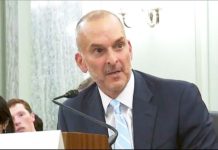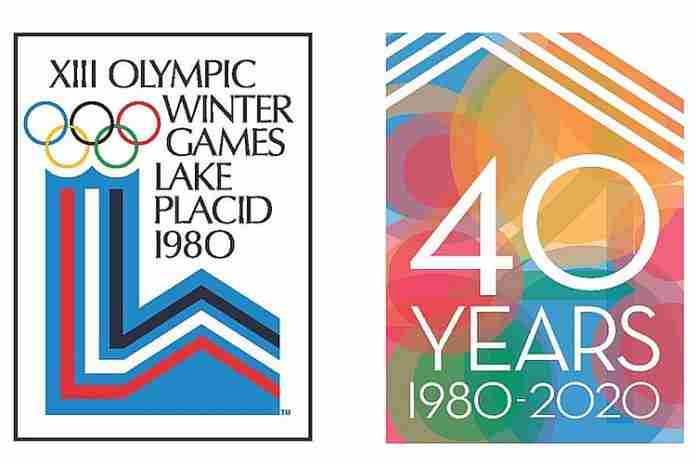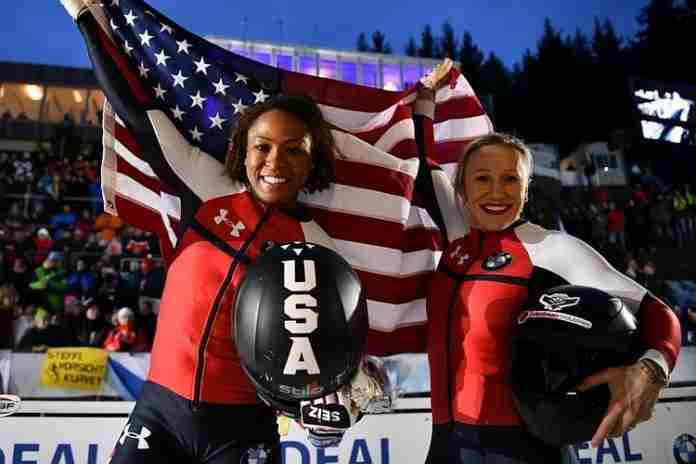Time to step aside and let someone else tell the story. Mike Moran was the voice of the United States Olympic Committee, and its chief spokesman from 1979-2003. Now the Senior Media Consultant for the Colorado Springs Sports Corporation, he wrote an excellent remembrance of one of the most iconic moments in American Olympic history:
Forty years ago on February 22, in Lake Placid,
American sport history was made by a hockey team
of youngsters and its incomparable coach
In tiny Lake Placid the morning of Friday, February 22, 1980, began unremarkably, or so it seemed. The Olympic Winter Games temperature was 30 degrees, with a forecast of light snow, sleet and freezing rain.
I got up early, around 5 a.m. in the small Lake Placid Resort house which the USOC had found for my staff of eight press attaches, made up mostly of legendary college sports information directors from across the nation.
Made some coffee and swallowed a piece of cold pizza left over from dinner the evening before, then headed down to Mirror Lake to take a $5.00 dogsled ride across to the town and the main press center in the Lake Placid High School building.
I knew my day was going to be memorable, because the upstart U.S. Olympic ice hockey team was set to meet the greatest team in the world, the terrifying Soviet Union, at 5:00 in the Olympic Arena.
The pugnacious Americans, coached by Herb Brooks, had reached the medal round by tying Sweden in its opener, 2-2, thanks to a 6-man power play with 22 seconds left by Bill Baker of the University of Minnesota, then skating past Czechoslovakia, Norway, Romania and West Germany.
Baker, whose shot made it possible for the American kids to be alive and make the medal round, was just one of a collection of twenty-somethings from college programs like Minnesota, Boston University, Wisconsin, North Dakota and Bowling Green. The team was picked by Brooks and his staff at the end of the USOC’s 1979 National Sports Festival in Colorado Springs.
The hockey portion of the second edition of the new event was conducted at the original Broadmoor World Arena. Convened in late July as an initial tryout for the 1980 Winter Olympics, it became a seminal moment in the American march to improbable Lake Placid gold.
The dominant Soviet team, coached by legendary Victor Tikhonov, was made up of half a dozen Red Army skaters over 30, and seven more over 25, including the world’s most celebrated goaltender, 27-year-old Vladislav Tretiak and 35-year-old team captain Boris Mikhailov, considered the top forward in the world.
This matchup against the Soviets had become special after the surprising run by the Americans. On February 9 at Madison Square Garden, the USSR had destroyed the young U.S. Team, 10-3, in an exhibition game that seemed to throw cold water on the prospect of a rematch in Lake Placid. A year earlier, the mighty USSR had whipped the formidable NHL All-Star Team, 6-0, in the title game of the World Challenge Cup at the Garden, and that was all the world needed to know going into the Olympics.
ABC had made an attempt, along with AHAUS [Amateur Hockey Association of the U.S.], then the U.S. governing body for the sport, to get the starting time changed to 8:00 because of the huge interest in the game, but the International Ice Hockey Federation refused to budge.
There would then actually be no live television of the historic game anywhere in the United States. None. Only a radio broadcast.
Crickets.
Nonetheless, I needed another 60 special tickets for the game for the American media after I had already exhausted my meager allotment of 40. I would get some because we had made the medal round, but I would need to spend much of the day going from country to country’s attaches to beg for their tickets which were no longer needed because their team was on the sidelines.
I managed 50 after exhausting every favor promised, every chit collected, and the empathy of the IOC Press Commission members Bob Miyakawa of Japan and Matti Salmenkylä of Finland, who had become good friends every night at midnight when I asked them for my quota of daily press tickets backstage at the high school for major events.
So, there I was at the gate at the Olympic Arena, armed with a list of media getting the seats, at 4:00.
The crush of journalists ended quickly, and in fact I was left with one extra ticket, which I have remaining in my scrapbook, autographed by Brooks, Mike Eruzione and Jim Craig, two of the team’s magnificent stars.
You know the rest.
The turning point of the game — Soviet Coach Tikhonov’s benching of the world’s premier goaltender of that era, Tretiak. He was pulled after Mark Johnson‘s sudden and thrilling goal tied the score at 2-2 with one second remaining in the first period. It set the stage for Mike Eruzione’s third period shot heard ‘round the world with ten minutes left to break a 3-3 tie and set up the frenzied, ear-splitting final moments.
The victory became one of the most iconic moments of the Games and in U.S. sports. Equally well-known was the television call of the final seconds of the game by Al Michaels for ABC, in which he declared: “Do you believe in miracles? YES!”
Dubbed the “Miracle on Ice,” the Americans defeated the Soviets, 4-3, “Few victories in American Olympic play have provoked reaction comparable to tonight’s decision at the red-seated, smallish Olympic Field House,” wrote The New York Times’s great columnist Dave Anderson. “At the final buzzer, after the fans had chanted seconds away, fathers and mothers and friends of the United Sates players dashed onto the ice, hugging anyone they could find in red, white and blue uniforms.”
Bedlam ensued and America gradually found out what happened during an ABC late evening rebroadcast and celebrated from Radio City Music Hall to the Golden Gate.
I had watched the game using a seat in the press area, and in the dizzying final moments was repeatedly whacked on my back by famed Detroit News sports columnist Joe Falls of the Detroit News.
As I left the arena and the bedlam, in a light, wonderful snowfall, I looked forward to a press conference at the main press center with this team and Brooks which would capture the moment for more than 600 journalists.
But it never happened. Brooks sent word that he and the team were not going to be available to the worldwide media. It was jaw-dropping news, and we settled for an appearance by backup goalie Steve Janaszak of Minnesota, who had not played, and assistant coach Craig Patrick, who was on loan from the New York Rangers.
Later that night, hundreds celebrated on the ice at Mirror Lake and in the tiny town. Millions of Americans, depressed with never ending news about Iranian hostages, long gas lines and a weak stock market, opened up with joy in homes, taverns, on ski slopes and during concerts and interrupted meetings.
Oh, AHAUS President Walter Bush eventually forced Brooks to make the team available the next day after practice ahead of the gold medal game set for Sunday. Brooks would not attend. I moderated a 30-minute scrum with the players still in their practice gear, sweating, towels around their necks. The players were Brooks-like quiet and careful.
On February 24, a day some forty years ago, the USA boys finished the job by beating Finland, 4-2, overcoming a sluggish start and a 2-1 Finnish lead after two periods.
Between periods, U.S. coach Brooks was livid. He famously told his players that if they didn’t find a way to win it in the final 20 minutes, they would take the loss “to their (expletive deleted) graves”. That speech fired up the team, and Phil Verchota came through off an assist from Dave Christian to tie it at 2-2 early in the third period.
The eventual game-winner came from Rob McClanahan, who was set up by Mark Johnson for a 3-2 lead. There was still more than half a period to play, however, and the desperate Finns took advantage of three straight USA penalties (to Neal Broten, Dave Christian and Verchota), to apply heavy pressure on Craig.
Craig stood up to the test, and with time running out in the Verchota penalty, U.S. scoring leader Johnson scored a shorthanded goal at 16:25 of the third period to make it 4-2, and complete the Miracle.
Eruzione recalled the moments after the gold medal game later. “When the game ended and we beat Finland, Brooks never came out on the ice to celebrate. He let us enjoy the moment. It was our moment. Herb was demanding and very difficult at times, but beneath that veneer he had a heart of gold.”
The team and Brooks received a post-game call from President Jimmy Carter, who infamously forced the USOC to boycott the 1980 Olympic Games in Moscow, then we flew the whole collection of teams to the White House a day later for a ceremony that sticks in my throat four decades later.
Eruzione is 65 now, and still entertaining groups with his stories. He gave me a team-signed game jersey in Salt Lake City in 2002 when I announced my retirement from the USOC. In fact, most of this team is now in their 60s, some auctioning off their game jerseys, sticks, even their medals to help send grandchildren to college.
I made a few appearances with Eruzione over the years at college fundraising events and we sat on leather chairs on stage, showed the game’s video final moments and relished seeing him pass his gold medal around to a hushed crowd afterward.
Brooks, the right man for the right time in American Olympic history, was killed in a car crash on August 11, 2003, at the age of 66, returning to the Twin Cities after a golf tournament.
He was eulogized on August 16 before 2,500 people gathered to mourn the legendary hockey coach at the Cathedral of St. Paul.
“Right now, he’s saying to God: ‘I don’t like the style of your team. We should change it,'” Eruzione said. “He had a passion to coach, a passion to teach, it was hard for him to show his emotions. He’s like your dad — you love your dad, but sometimes you don’t like him because he makes you do things you don’t want to do.”
A lone bagpiper played “Amazing Grace” as the casket, followed by tearful mourners, made its way to a waiting black hearse before heading to a private burial location. Overhead, a squadron of planes flew the missing man formation.
But the saga of Brooks and his astonishing collection of players and a system designed to overcome the odds at Lake Placid continues to be told from Cloquet to Colorado Springs in winters without end.
¶
With thanks to Mike for allowing us to reprint his memories of an amazing day.
Rich Perelman
Editor
(Special thanks to Los Angeles Times and Hockey Hall of Fame reporter Helene Elliott for a correction to “Amateur Hockey Association of the U.S.” Thanks, Helene!)
You can receive our exclusive TSX Report by e-mail by clicking here. You can also refer a friend by clicking here.


























